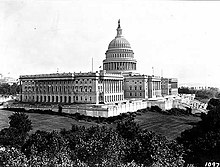Sixty-fifth Congress
| 65th United States Congress | |
|---|---|
|
64th ←
→ 66th
|
|

United States Capitol (1906)
|
|
| March 4, 1917 – March 4, 1919 | |
| Senate President | Thomas R. Marshall (D) |
| Senate Pres. pro tem | Willard Saulsbury, Jr. (D) |
| House Speaker | Champ Clark (D) |
| Members | 96 Senators 435 Representatives 5 Non-voting members |
| Senate Majority | Democratic |
| House Majority | Democratic (coalition) |
| Sessions | |
|
Special: March 5, 1917 – March 16, 1917 1st: April 2, 1917 – October 6, 1917 2nd: December 3, 1917 – November 21, 1918 3rd: December 2, 1918 – March 3, 1919 |
|
The Sixty-fifth United States Congress was a meeting of the legislative branch of the United States federal government, composed of the United States Senate and the United States House of Representatives. It met in Washington, DC from March 4, 1917, to March 4, 1919, during the fifth and sixth years of Woodrow Wilson's presidency. The apportionment of seats in this House of Representatives was based on the Thirteenth Census of the United States in 1910. The Senate had a Democratic majority, and the House had a Republican plurality but the Democrats remained in control with the support of the Progressives and Socialist Representative Meyer London.
Because of the 17th Amendment, starting in 1914 U.S. Senators were directly elected instead of by the state legislatures. However, this did not affect the terms of U.S. Senators whose terms had started before that Amendment took effect, In this Congress, Class 2 meant their term ended with this Congress, requiring reelection in 1918; Class 3 meant their term began in the last Congress, requiring reelection in 1920; and Class 1 meant their term began in this Congress, requiring reelection in 1922.
The count below reflects changes from the beginning of the first session of this Congress.
Lists of committees and their party leaders, for members (House and Senate) of the committees and their assignments, go into the Official Congressional Directory at the bottom of the article and click on the link (6 links), in the directory after the pages of terms of service, you will see the committees of the Senate, House (Standing with Subcommittees, Select and Special) and Joint and after the committee pages, you will see the House/Senate committee assignments in the directory, on the committees section of the House and Senate in the Official Congressional Directory, the committee's members on the first row on the left side shows the chairman of the committee and on the right side shows the ranking member of the committee.
...
Wikipedia
